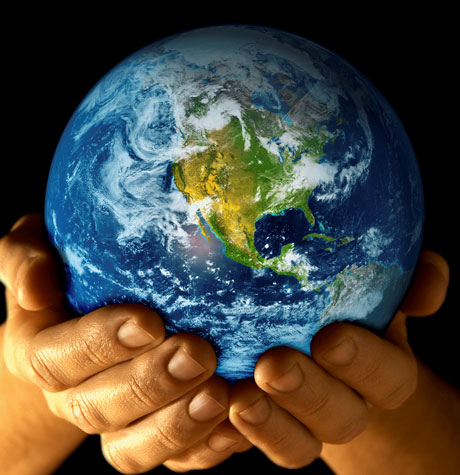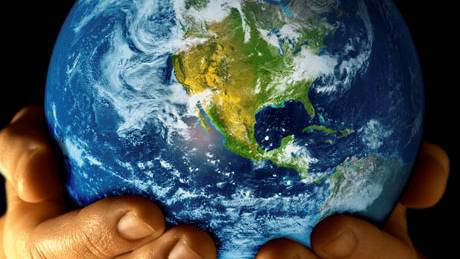How Food Riots, Pricey Gas and Home Foreclosures Point to a Better Future
Source: alternet.org

We are beset today by a systemic global crisis that could open the way to hopeful transformation. It is up to us.
Can anybody make sense of what the heck is going on today? A lead story in the news covers the rioting in Haiti and a half-dozen other nations as food prices soar. Another front-page column reports that the U.S. subprime mortgage crisis is seizing up credit markets worldwide and contributing to housing woes -- possibly even economic destabilization -- in Ireland, Spain, Britain and elsewhere. Other news reports the discovery of a huge fracture in Antarctica’s vast Wilkins ice shelf, drawing attention to the slow-motion crisis of climate change. And there are ongoing reports about water shortages in Africa and Asia, droughts in Australia, sky-rocketing oil costs, the razing of the Amazon and images of war and terror.
Is the conjunction of these various crises simply a coincidence? The answer is no. From a historical perspective it is possible to see an overall pattern that connects the dots. What is unfolding today is a systemic crisis, heralding the beginning of a large-scale shift at the deepest levels of cultural organization. We are in transition -- for the first time in history -- to a tightly interconnected global system. We have entered the planetary phase of civilization, in a passage that may prove as significant as the advent of agriculture or the Industrial Revolution.
When keeping our thermostats high melts ice sheets at the bottom of the world, when our housing crisis erodes the world economy, when filling our cars with biofuel from corn contributes to hunger a world away, we’re not in Kansas anymore. We need a new map of the world. The old one -- with its geopolitics based on the competition of self-interested nation-states and its economy growing exponentially atop a natural world of unlimited resources -- is vanishing, along with cheap gasoline.
The new map conceptualizes the world as a single global system with interacting, nested subsystems. In this view, lines of connection reach beyond national borders to embrace all of humanity -- linking the poor in Haiti to homeowners in Spain to investors in the United States -- and reaching beyond society to the larger earth community, encompassing even the very air itself. All are entwined in a common fate. All compose a single system and must find their place on a new map, as we rechart the world for a new era.
Transitions announce themselves in the language of crisis. We are in a time of turbulence as old patterns give way and new ones form. The multiple crises today signal a system transformation operating at the scale of the planet. Transformation is distinct from adaptation, which is the normal process of incremental adjustment to new conditions. Transformations are rare moments in history when dominant societal structures cannot cope with emerging developments and change in fundamental ways. With the converging lines of crises we face today, we may be entering a perfect storm of destabilizing stress.
We cannot predict the future. It may be good, bad or ugly, depending on how events unfold and how we respond. But scenarios can help us envision alternate futures, and our organization has -- with the aid of an international group -- crafted four scenarios of possible futures. In a "market forces" scenario, the United States continues with business as usual, other nations converge toward American lifestyles, economic growth remains the sine qua non of development, and environmental strain and cultural polarization intensify. In "policy reform," government seeks ambitious policies to protect the environment and reduce inequity; but with the ethos of consumerism unchecked, the reformist path could be overwhelmed by unsustainable trends. In "fortress world," reform fails and problems cascade into self-amplifying crises as the affluent retreat into protected enclaves amid oceans of misery.
In a "great transition" scenario, mounting crises lead not to breakdown but to breakthrough into a sustainable culture, where we shrink our environmental footprint, not only because we must live lightly and equitably on this small planet, but because quality of life matters more than quantity of stuff. It is a world where global interdependence -- as both a fact of history and a moral imperative -- replaces the heedless pursuit of self-interest as a guiding ethos. Such a resilient, just and livable world order is possible, though not inevitable. We do not offer facile hope. Large-scale social transformation does not come from small-scale woes: A time of troubles lies ahead.
Nevertheless, there is a case for hope. In the turbulence of transition, small actions can have big effects. We stand at a moment of unparalleled creative opportunity that calls for bold leaders and engaged citizens to articulate new visions of a 21st century social order and to mobilize a global movement to bring these visions to reality. Our world today generates more despair and resignation than vision and action. But it would not be the first time that an effervescence of popular political energy arrived unexpectedly to shift the direction of history.
We are beset today not by random bad luck, but by a systemic crisis that could -- on the other side of calamity -- open the way to hopeful transformation. It is up to us.
Article from: http://www.alternet.org/story/84960/






















